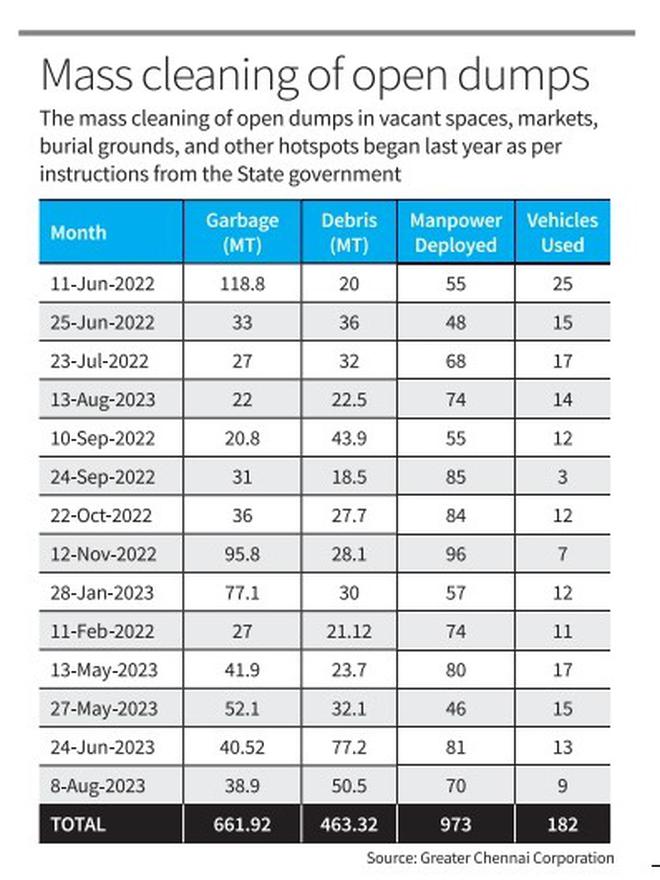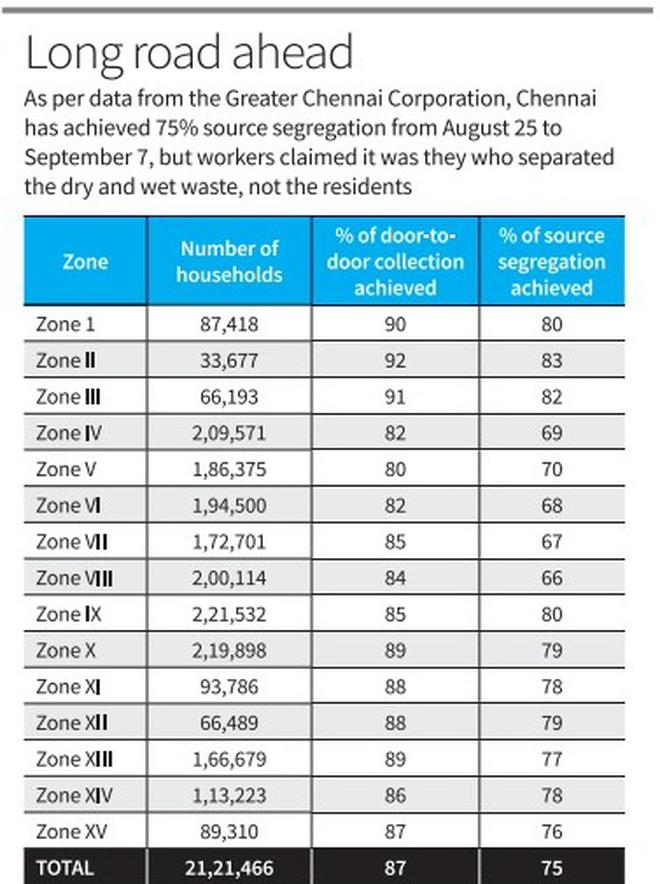
“I was taught source segregation in my school and we practise it there regularly. At home, I don’t. Nobody in my family does. My friends know about it, but I’m sure their families don’t follow it too. It’s not customary,” said a Class X student of a private school, residing in the Tamil Nadu Housing Board unit at Royapuram under Zone 5 of the Greater Chennai Corporation.
According to data from the Corporation, in the first fortnight of September, regular door-to-door collection was done in 87% of the 21,21,466 houses in all 15 zones. And 75% of the waste collected was segregated at source. However, the reality is different. Conservancy workers say it is they who separate dry and wet waste, and not residents.
How effectively scientific solid waste management is being implemented in the city is open to debate. Complaints were filed, even on the social media, with the Chennai Corporation from across the city about the waste strewn around bins and open spaces and the need to clear it.
There were also suggestions that the Chennai Corporation take its cue from Indore, which was declared the first cleanest city of the nation under the Swachh Bharat Mission. Notably, it is the largest and most populated city in Madhya Pradesh.
The key word, as far as the civic body goes, is co-operation. Primarily from residents. Granted, the problem also stems from restaurants, large public spaces and the corporate sector. But if residents are considered a homogenous block, at over 21 lakh homes, they are the largest unit.
Dumped around the bin
An 86-year-old fruit seller at Royapuram says the bin placed opposite a temple remains full most of the time, except when the private company, contracted by the Corporation for solid waste management, collects the garbage in the morning. “Every morning, residents of the housing board hand over unsegregated waste to the door-to-door collectors, while others dump their garbage around the bin and on the streets at night. Despite the efforts of [NGO] volunteers, residents are reluctant to segregate their household waste. Workers sort dry and wet waste daily before collection by the vehicles,” she says.
A resident of Zone 7 at Ambattur, close to Rakhi Theatre, admits that people do not separate waste, which piles in the bins at the street corners. At the other end of the city, at Sholinganallur, a resident says locals find scientific waste segregation tedious. In Zone 9 at Boat Club, conservancy workers are clearing the mixed waste in the five bins on Adyar Club Gate Road from 7.30 a.m. to 10 a.m. “Till 9 a.m., over 10 tonnes of garden waste dumped on the pavement was cleared. Now, we will separate the waste in the bins,” said a sanitary worker of the Corporation.
Workers threatened and abused
“It is different in different areas. Two years ago, someone in a housing board complex chucked a glass bottle from a top floor. It landed on our worker’s head, injuring him severely. In residential areas like Ambattur, where I was earlier assigned, people throw waste around the bins. Only we separate the waste. We were threatened, even abused, by residents, while we requested them for compliance with source segregation. No point asking them any more,” the sanitary worker said.
Another worker of Urbaser Sumeet, the private company, says that though the workers are given safety gear, the smell and working constantly in unhygienic surroundings have caused her breathing issues. “Before this job, I was a sweeper in the Corporation. I had constant back-pain from clearing road-side waste and fishing out waste from the storm water drains, especially during festive season. It would be ideal if people maintain two bins at home and discard waste as per rules.” The civic body officials say they are caught between a rock and a hard place. An official says some residents ask for the bins to be removed from the streets for source segregation to become mandatory. But when that is done, open spaces, drains, waterbodies and even burial grounds turn dump-yards. Recently, it took the Corporation 43 trips by the 8-tonne garbage collection vehicles to clear 259.7 tonnes of garbage and debris and retrieve 20 acres of land at Foreshore Estate belonging to the Tamil Nadu Urban Habitat Development Board.
No use in monitoring
Chief Engineer (Solid Waste Management) N. Mahesan says there is a gap in source segregation though the hotspots, markets, vacant land, burial grounds, commercial zones, residential areas and bins are monitored through the Integrated Command and Control Centre. “Through mass drives conducted every Saturday from June 11, 2022, to August 8 this year, 661.92 tonnes of mixed waste was collected by 903 workers, apart from daily waste. Between August 19 and September 23, we collected ₹49,500 in fine from those who littered vacant land and ₹21,400 from those clogged waterbodies. Yet, the problem persists,” he adds.
Commissioner J. Radhakrishnan underscores the importance of sensitising the residents to the seriousness of this issue constantly. The climate conditions here are humid and people discard waste in the open from time to time. The stench spreads faster, he says. The residents must separate the dry waste from the food and wet waste, he adds. “Mattresses, and even wash basins, are thrown on the road sides,” he points out.
According to Pari Selvam of Social Work Team Trust, an NGO for environmental protection, children follow waste segregation in school but not at home because there is no fear of punishment at home. “When the educated people dump waste from their cars, how can one expect it to happen at the grass-roots? People agitate when strict action is taken or fines are levied as they feel it is within their right to litter anywhere. Even if I follow norms, my neighbour wouldn’t and asking him to do so will only cause an argument. If I have large waste like beds or mattresses, I don’t know the right method of their disposal. The Corporation needs to address this problem, too,” he says.








